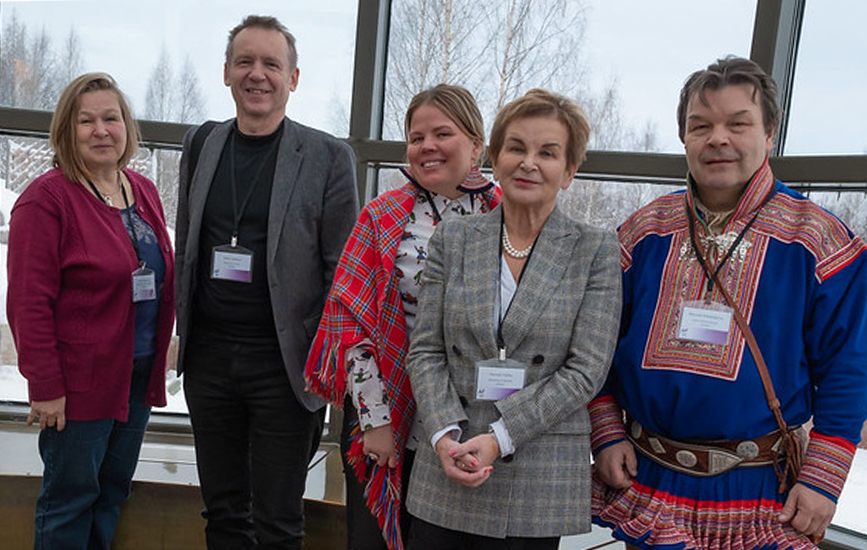
Report from Rovaniemi Arctic Spirit 2023: Collaborative Science in the Sámi Climate Council to address Climate Change
17.1.2024
The biennial Rovaniemi Arctic Spirit Conference, 13th to 15th November, had the honour to host the first ever public appearance of the newly appointed Sámi Climate Council in a panel discussion organised by the Arctic Society of Finland. This report summarizes the session on knowledge co-creation and climate change in the Nordics, which was conducted in Finnish.
The Sámi Climate Council was appointed by the Finnish Government on August 24, 2023. The Council is a new independent expert body, tasked with bringing the knowledge base and perspectives of the Sámi people into the climate policy processes. Chaired by Dr. Klemetti Näkkäläjärvi, Postdoctoral Researcher at the University of Oulu, it has 12 members representing various fields of science and holders of traditional Sámi knowledge.
At the Rovaniemi Arctic Spirit Conference session, Dr. Näkkäläjärvi and Vice-Chair Petra Biret Magga-Vars represented the Council in the panel discussion. They were joined by Outi Honkatukia, Chief Negotiator for Climate Change at the Ministry of Environment. Professor of Practice Hannele Pokka from Helsinki University, who inaugurated the event in her role as the vice-chair of the Arctic Society of Finland also participated in the discussion. The discussion was led by Professor Jouni J.K. Jaakkola from Oulu University, a member of the Finnish Climate Change Panel.
During her opening remarks, Professor Pokka highlighted the rapidly changing global geopolitical situation and its ramifications to the Arctic flora and fauna, communities and the hope embedded in our collective efforts for the future. While congratulating the new Council, she expressed gratitude for the chance to delve into discussions about the Council's future, extending wishes of strength and success for upcoming endeavours. Professor Pokka also emphasised her deep concerns regarding the climate crisis and its potential adverse effects on the living conditions of the Sámi people in the Arctic.
Dr. Näkkäläjärvi continued with his introductory words, which would pave the way for the panel discussion. He highlighted the global significance of this new, legally appointed independent expert body, appointed for a four-year term. The Council is a unique way to address the particularly vulnerable status of the Sámi culture and way of life, in the context of planning and implementing actions during warming temperatures. Yet, the local, community level significance is what this first public appearance of the panel wished to highlight.
The Council's distinctive structure follows a dual approach, requiring representation from both scientific fields and traditional Sámi knowledge holders. This alone is a significant step towards equal representation in policy planning as although traditional knowledge is acknowledged in the international scientific field, a universally accepted definition has not been established. It was noted in discussion that the absence of a shared terminology poses a barrier to establishing a solid foundation to create something new and stable that would improve the role of the Sámi culture in climate policy planning. The lack of definition also results in a lack of protection, as was highlighted by Näkkäläjärvi. This is a challenge the Council will undertake: to define what is traditional Sámi knowledge, and what is its relation to climate change and its mitigation and adaption actions. The next steps for the Council involve collecting and analysing existing knowledge, followed by the translation of this awareness into tangible practices.
The consistent topic of the panel discussion was, indeed, tangible action. The Council has a strong incentive and passion to devise practical, beneficial, and implementable approaches to incorporate Sámi traditional knowledge into decision-making. This involves establishing an effective platform for dialogue, issuing statements and actively engaging in public discussion. Additionally, the panel emphasised the importance of disseminating this knowledge in the Arctic to empower local initiatives. This includes programs ranging from educational and training activity to practical tasks such as removing pine seedlings in the fell to safeguard the landscape from deterioration.
The discussion particularly focused on youth and children, with panellists recounting how they became initially aware of climate change during their formative years. These moments had happened in their early childhood or in their adolescence, and it had been a memorable occasion coloured with a great deal of uncertainty, and even anxiety. The young people of today are acutely aware of the negative impacts of climate change, with increasing pressures to take action, adapt and to even make radical decisions very early – whether to follow the traditional way of living in Sápmi with increasing pressure towards the culture and the way of life, or leaving the community in the hope of more secured living conditions. The panellists concurred that this unprecedented stress is a burden no young person should bear.
Yet the discussion about the future introduced a hopeful element, recognising that the future belongs to the young people. We now have the opportunity to support youth and future generations in leading healthy lives within the culture they find safe and secure to embrace. To facilitate this, the Sámi Climate Council provides a structured tool for use.
Rapporteur:
Marja Helena Sivonen
Doctoral Researcher
Finnish Environment Institute
Tampere University
Board member of the Arctic Society of Finland
“The purpose of the Arctic Society of Finland is to follow the development of the Arctic region and to influence decisions concerning the Arctic region in the interests of Finland. In order to attain its purpose the society organizes seminars, lectures and other events and maintains contacts with international and Finnish organizations, research institutes, universities and other organizations that deal with issues concerning the Arctic regions. The Arctic Society of Finland was founded on the 18th of September 2012.”
http://https//www.arcticfinland.fi/Arktinenseura/EN
|